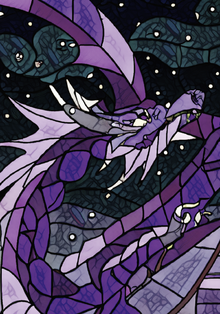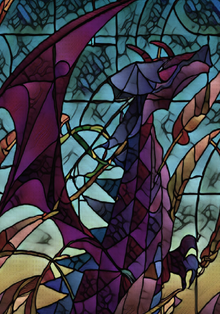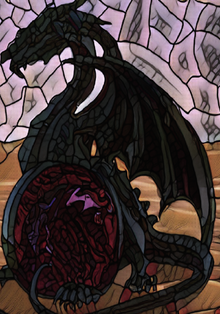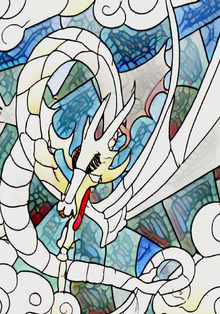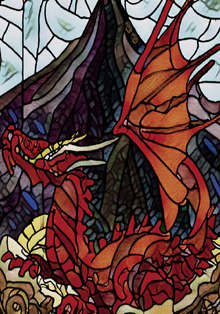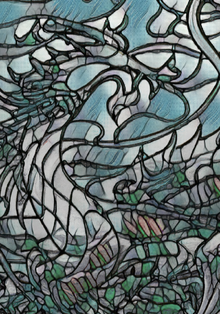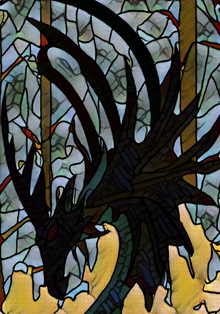More actions
No edit summary |
No edit summary |
||
| Line 1: | Line 1: | ||
{{Info religion | {{Info religion | ||
|image = | |image = Gdwsgdse.png | ||
|pronunciation = | |pronunciation = Dragon Worship | ||
|origins = | |origins = Unknown, presumed over 7000 years ago | ||
|deities = | |deities = Rhaakhr, Asaph, Saaima, Anlon, and Qaarn | ||
|subsects = Various Foundation Thrones and other Goddesses and Gods | |||
|subsects = | |||
|}} | |}} | ||
==Origins== | ==Origins== | ||
Dragon Worship or Dregodar is commonly believed to be the world’s oldest [[Religion]], one that is uniquely shared by many Races and potentially the most widely worshiped religion across the world, while other religions are fairly monolithic within their own Race or Ideology. The nickname Dregodar dates back to the earliest Dragon Worship cults among the [[Altalar]] during the days of the [[Allorn Empire]], a name specifically used to refer to their cult. While Dragon Worship is thousands of years older than the Altalar, the last major group of people who worshiped the Dragons were a sect of Altalar, hence it carries their name. After the collapse of the Allorn Empire, Dragon Worship was mostly kept alive in the largest population groups by Ailor, hence why the Dragon Worship pantheon mostly carries Proto-Daen names, the language used by the Ailor slaves who suffered their existence under the Allorn Empire. Dragon Worship was in fact one of the largest if not only religion followed by the Ailor slaves in the west, as the Dragons remained somewhat visible and tangible, while the Old Gods had all but disappeared. Following the collapse of the Allorn Empire, Dragon Worship entered a lull, with pockets of various races like the Isldar, Songaskians, Slizzar, Sihai and Urlan keeping their traditions alive, though living with the knowledge that all the Dragons save the eastern had died. Dragon Worship has more recently exploded back onto the scene with modern events, the return of Dragons, and their enduring campaign to revive all the Dragons who could not truly be killed. Many regions previously thought Unionist converted suddenly revealed their hidden Dragon Worship habits, thus exposing that Dragon Worship was far from dead, but actually one of the major religions of the world, being just behind [[Estellon]] and [[Unionism]] as the third largest religion in the world by number of worshipers, and only barely ahead of [[Void Worship]] coming fourth. | |||
==Core Identity== | ==Core Identity== | ||
Dragon Worship is a [[Religion]] centered around the struggle against (or with) the Occult, with each Dragon having their own ideology and needs, and prescribed way of living. Dragon Worship is somewhat of a unique religion in that most of the dogma was inspired by the Dragons, but never dictated by them. While there were certainly Dragons who worked with the idea of themselves being seen as Gods, and used whatever benefit they could from that situation, the majority of Dragons do not actively demand worship and don't wish punishment on those who stray from the faith. The Dragons have always strictly insisted that spirituality towards them is a personal choice, and that faith is a personal choice, and that no matter what religion anyone follows, simply being alive is good enough to serve their needs. | |||
===Tenets=== | ===Tenets=== | ||
* '''Bravery:''' | * '''Bravery:''' Caius demands bravery from the faithful, or face his eternal wrath for cowardice and weakness in purging fire. | ||
* '''Calm:''' | * '''Calm:''' Nox demands calm in the face of chaos and anarchy, for the steadiest hands and cleanest mind plot the most skillfully. | ||
* '''Pleasure:''' | * '''Pleasure:''' Aurora demands pleasure, because the purpose of life is to proliferate. Marriage is just a legal obstacle. | ||
* '''Ambition:''' | * '''Ambition:''' Valerius demands ambition, because static contentedness is the death of progress and change in a world in need of it. | ||
* '''Diligence:''' | * '''Diligence:''' Marik demands diligence, because the task set out to the faithful is never done, never given reprieve, never an end in sight. | ||
* '''Revenge:''' | * '''Revenge:''' The Void stole Ruin from the Pantheon, and the Dragons bid the faithful never to forget the damage infection has brought. | ||
* ''' | * '''Charity:''' Severena demands charity, for the agents of life are created in the sentient, who must share their intellect for the benefit of others. | ||
* ''' | * '''Honest:''' Regulus demands honesty, because history is the true arbitrator of truth, and truth always prevails. | ||
* ''' | * '''Purity:''' Dragon Worship does not outright ban Occult from worshiping, but proclaims to be pure and mundane, is the ideal for everyone to strive for. | ||
* ''' | * '''Preservation:''' Dragon Worship is the only faith nominally focused on the preservation of the world as it is, all living creatures and plants, and living harmoniously with nature. | ||
* ''' | * '''True Magic:''' Dragon Worship pats itself on the shoulder for being the users of "true" (Primal) Magic, a sense of moral superiority over Void and Exist and Ordial follows after. | ||
===Beliefs=== | ===Beliefs=== | ||
* '''Narrative:''' | * '''Narrative:''' Dragon Worshipers have the hauthy opinion that all other creation myths are false, and that the Dragons are actually the true creators of the world. Naturally most religions have ideas about creation myths of their own, but Dragon Worship has one based on more tangible fact that myth. Inversely however, while all other religions have one "grand message" or intention to imprint on the faithful, something for them to prove or do in their life, Dragon Worship has no such conceit, and just requests that the faithful live their life to the fullest without causing undue harm on other living beings without respect for nature, while also respecting some of the behavioral tenets for good conduct set out by the Dragons. Dragon Worshipers do not believe in an afterlife, at least not strictly understood by other religions. There is an afterlife for the Dragon Faithful, however they call them the "Soul Rivers", in which Souls exist in a state of ignorance and unconsciousness, meaning that while a soul can be preserved, there is no such thing as a living and wake afterlife. Dragon Worshipers, because of this belief, live their life to the fullest as they have it, because they only have one life to live. | ||
* '''Canon Evil:''' Canon evil in | * '''Canon Evil:''' Canon evil in Dragon Worship is all that which comes from other planes of reality or existence, meaning anything that is Void, Exist and Ordial. Rather than painting all of it evil by default however, truth (and the individual interpretations and ideologies of the Dragons) vary wildly from Dragon to Dragon. While all roughly agree that Void/Exist/Ordial (called "Infection") is bad, they all practically disagree on how to deal with it, or how severely bad it actually is. | ||
* '''Identity:''' | * '''Identity:''' Dragon Worship has no real concept of sex or gender, nor does it have a view on sexual orientation. The only thing Dragon Worship does profess, is the need for the faithful to keep reproducing because the purpose of life is to exist and multiply to further life. While some would argue this means they do not look favorable upon those of same-sex orientations, the reality is that Dragons believe that there are plenty of heterosexuals who reproduce excessive amounts, to compensate for the few chaste, unable, and unwilling reproducing individuals. | ||
* '''Conversion:''' Converting away from | * '''Conversion:''' Converting away from Dragon Worship is not a crime per se, but there are subtextual responses that one might get from different faithful. Caius worshipers might for example consider it weak and spineless, while Nox worshipers consider it willful ignorance that makes one more stupid. There is no outright punishment, but Dragon Worshipers have been known to give the cold shoulder to "traitors" of the faith. They do not go out to convert others however, Dragon Worship is a religion entirely benched on the providence provided by the very tangible actions of Dragons, and the faithful in general do not proselytize, but answer and reflect with those who show interest. | ||
* '''Sins & Taboo:''' Sins and Taboos | * '''Sins & Taboo:''' Dragon Worship lacks traditional Sins and Taboos, because even the concept of Sin is considered divine. While a morality and code to live by is created and the implication is made that going against this code is sinful, there is no real punishment system for sinners, and an argument can even be made that a sin is only a natural result of Nerida, the Dragon of Sin, who creates sin as a byproduct of free will, which in turn creates the structure for religion. To be free of Sin is to be free of free will and faith, neither of which are considered a good thing, as Dragons contemplate that spirituality is one of the foundational needs of sentient living beings. | ||
==Gods and Goddesses== | ==Gods and Goddesses== | ||
Dragon Worship is divided over the 7 Great Dragons, each which is supported by 7 Supporting Dragons. Technically there are many more Dragons, for example, while in the realm of the Silver Dragons under Nox they reign supreme, the Yellow and Teal Dragons also exist. These however do not express spiritual guidance or an ideology, and merely exist to fulfill earthly functions of the Great Dragons, and as such are also not considered Gods, merely agents of them. The supporting Dragons act like officers, each governing an aspect of reality and enforcing it within their realm and across the world. Dragon Worshipers consider the usage of Magic an encroachment on the realm of their Gods, for example, if a Mage were to turn back time on an object, this would be a violation of the Dragon Ramirus, who is the enforcer of time, ensuring it always moves forwards and never backwards. This is entire foundation of why Void/Exist/Ordial are considered corruption or "infection", because they deny the laws of reality and how things are in Aloria by changing the rules. Choosing one particular Patron Dragon is important to Dragon Worshipers, though only in the purview of how to behave towards Occult. Dragon Worshipers worship in some part all Dragons equally, but choose one in particular to theme themselves and their ideology after. A Dragon Worshiper is likely to have some sort of shrine to each Dragon in their home, but one particularly large shrine for their favored Dragon, whose general ideology they have adopted as their own. There is no conflict in worshiping Caius as favored, and still bringing homage to Regulus even if their ideologies on the Occult differ, each ideology is considered valid in their own Draconic authority. This does not, however, stop conflict from arising among Dragon Worshipers on the "right" way to deal with a problem (the Occult). Among Dragon Worshipers, a strained truce usually reigns to prevent conflict among themselves while the Occult remain a problem. but clashes frequently break out when for example a Regulus worshiper is trying to protect an Occult from a Caius worshiper. | |||
===Aurora, Arbitrator of Nature=== | ===Aurora, Arbitrator of Nature=== | ||
{| | {| | ||
| Line 105: | Line 102: | ||
|[[File:Silverzaal.png|220px|thumb|left]] | |[[File:Silverzaal.png|220px|thumb|left]] | ||
| | | | ||
*'''Identity:''' Nox is the Dragon of the Mirrored Reality, of trickery, or disguise, of misdirection, and of the silver tongue. They are seen as the master of conspiracies and plots, a Lirh that commands their subjects to be excellent or be irrelevant, that the stupid should be ensnared by the clever, and that the greatest power lies in a whisper, not a shout or a stab. Nox is the most secretive of the Dragons, and one who has frequently worked against the grain of the other Dragons to pursue their own enigmatic goals. | |||
*'''Racial:''' Nox is strongly linked with the Slizzar and in lesser part the Allar, though almost uniquely seen as only for the Slizzar by other Dragon Worshipers. Nox is said to be the creator of Sassrakkand, and the creator of all the fantastical devices that keep said city state running sound and safe. They are the divine architect of the machinations of the Slizzar around the world, and even their creator, as Dragon Worshiping Slizzar believe that Nox created them in defiance of the creation standard set by the other Dragons, forged in secret, to live in secrets. | |||
*'''Clade:''' Nox is supported by Nerida of Godhood, Nerthus of Whispers, Naevius of Silence, Nerva of Joy, Nicator of Desires, Nicon of Knowledge, and Nicephorus of Mirrors. The Slizzar only acknowledge two of these Dragons with names in Zoram, that being Nox (who is Zaalaanzaal) and Nerida (who is Masraphaal). Nerida is considered a unique supporting Dragon, who acts more like a second in command, one more equal among equal Dragons serving Nox due to its pivotal speculated role in the creation of Sin. | |||
*'''Home:''' Nox’s home is the Silver Darpan, the massive pyramid shaped construct in the middle of Sassrakkand with a large gap running down the middle from which silver lights erupt into the starry night sky. The Silver Darpan is accessible only to Slizzar and their close relatives, as Sassrakkand as a city is closed off to outsiders who the guards will not suffer to pass. As a result, shrines to Nox are often found inside Nox worshiping homes as large and complex mirror arrangements. | |||
*'''Occult:''' Nox’s stance on the Occult is one of Contemptuous Domination. Nox is generally on the anti-Occult side of things when it concerns Dragons, but they can never fully agree with Caius’s destructive nature. Nox rather proposes that through deception and scheming, the Occult become ensnared by the faithful to serve as their unknowing servants in fighting the corruption and infection of the land. There is even some implication that the Cult of Drovv was heavily influenced by Nox at some point, and that all Sihndar are the end-result of that scheme, unknowing of their fate or Nox’s hand. | |||
*'''Themes:''' Nox’s themes are the color silver, mirrors, smoke, deflection and illusions, manipulation, whispers, closed mouths and open ears, thieves and spies, sabotage and subterfuge and the ability to weave webs of lies and manipulation to change the world in one’s own making. They propose disregarding the commands from those in undeserving positions of power, instead weaving one’s own designs through the hands of others so that the weaver may achieve penultimate power at the expense of others. | |||
*'''Worship:''' In a sense, Nox worshipers are extremely competitive. It is said among Nox worshipers that the greatest favor to them is to be the penultimate schemer, and in order to do so, one must often step over the corpses of others. Nox worship as a result, is considered somewhat causing collateral damage among Dragon Worshipers themselves, as Nox schemes can often act detrimental to other Dragon faithful. Nox faithful have been known to sell out the faithful of other Dragons if only to move ahead their own station in life. | |||
*'''History:''' Nox was incredibly active and present among the Slizzar for the entirety of history up until the point that they just vanished several centuries before Cataclysm, with none being the wiser. There is an implication among the Slizzar that the Anindriya have something to do with it, or are the product of it, however the Anindriya obviously do not talk, and none have the courage to find out otherwise. In fact, Nox’s disappearance was so complete, that even the famous Dragon Sites that record all of known history objectively, have no data on where they might have gone. | |||
|} | |} | ||
===Valerius, Force for Change=== | ===Valerius, Force for Change=== | ||
| Line 111: | Line 115: | ||
|[[File:Urlansdragon.png|220px|thumb|left]] | |[[File:Urlansdragon.png|220px|thumb|left]] | ||
| | | | ||
*'''Identity:''' Valerius is the Dragon of chane, of evolution, of betterment and self control, and of perpetual furtherance of creation and improvement upon creation to create a better self. Valerius is very much a self focused Dragon with an ideology that completely disregards the Occult problem while focusing more on purity and cleanliness of self, and improvement of both mind and body in the face of a world that is designed to break these things down. | |||
*'''Racial:''' Valerius is seen as the Urlan Dragon, Valerius herself appearing more beast-like than scaled Dragon, with crowns of antlers and horns from all manner of body parts. Valerius is said to be the mother of the Oorl Worms, and as such is seen as an indirect or even direct creator of every single Urlan in the world, at least for those who acknowledge Dragon Worship as their faith. Valerius is however also followed by those who have become disillusioned with Unionist evolution ideals, or worse yet, form the basis of those fading from Dragon Worship and into the hands of Void Worship, upset at how little the Dragons actually help the faithful. | |||
*'''Clade:''' Valerius is supported by Verus of Spring, Vesper of Summer, Vitalis of Autumn, Vena of Winter, Viatrix of Mind, Viola of Soul, and Vortigerus of Body. This Clade’s Dragons also have names in the native Urlan tongue, though the Urlan use the common and Oorl tongue translations interchangeably. Valerius is called Haarn in Oorl, while the other Dragons are called Hoshaara, Herkhat, Hattalis, Henhush, Hax, Henfos, and Hunefos. | |||
*'''Home:''' Valerius has several Dragon sites across Jorrhildr and the Skags, but most of these have fallen into ruin centuries ago, as they did not stand the test of time, weathered and battered by blizzards and rapid cooling as well as frost damage. Shrines to Valerius are without exception always built in the wilderness, a patch of grass in the forest, a cave, or a particularly large tree, always adorned in tribal designs, even for those Dragon Worshipers who style themselves as urban dwellers, due to the natural inclination to wildness in Valerius. | |||
*'''Occult:''' Valerius’s stance on the Occult is one of Evolved Osmosis. It is perhaps the most indifferent of ideologies, even more indifferent than Aurora, because rather than actively choosing not to get involved unless a problem arises, Valerius even avoids the problem altogether should it arise. Valerius’s ideology rests on the idea that infection and the Occult will eventually disappear when evolution and creation catches up to whatever cool things Occult can do with their own natural bodies, thus making the Occult redundant, and making people not want to be Occult anymore. | |||
*'''Themes:''' Valerius’s themes are the color brown, Urlan symbiosis, evolution, alchemy and technology, body modifications, transformations, and primal mutations. Valerius is a Dragon always in search of the best next thing to graft onto the living to create the perfect creature, and Urlan are perhaps her best succeeding subjects as of yet. Beyond bodily considerations, meditation, yoga and self-care are also very important for Valerius, as is frequently visiting a therapist and resolving neuroses in a healthy way. | |||
*'''Worship:''' Valerius worship is the very act of self improvement, whether that is as simple as reading a book, doing some gardening, or chasing after the magical solution to evolution. Valerius worship can however also be done simply by displaying the more evolved and better version of the self versus the other. This is often read as, stronger and more transformed individuals beating down on those who are weaker, or the sentient hunting wild animals to display the perfection of creation. As such, Valerius is sometimes also called the Dragon of the Hunt. | |||
*'''History:''' Valerius is perhaps one of the least seen Dragons. Even Nox appeared frequently to the Slizzar despite secrecy, and Caius appeared in the skies of Guldar despite living inside a Volcano. Valerius on the other hand, has never been witnessed by any living being directly. It is said that Valerius is incredibly shy, or simply does not want to be perceived. The only information anyone has ever gathered from Valerius, is from the flashes of memories of Oorl worms after Symbiosis, in which Valerius can be seen interacting with the Oorl worms and discussing ideologies with them. | |||
|} | |} | ||
==Trivia== | |||
*Dragon Worshipers can change their preferred Dragon Throne, but tend to generally stick with one for their entire lives. Changing a Throne is not seen as something shameful, but continually doing it over and over is. It is also considered shameful if it is done on a whim, as opposed to a major life event. | |||
* It is sometimes believed that Dragon Worship is compatible with Emended Unionism because Regulus being Cedromar is also a God in that pantheon, however this is not the case. Emended Unionism has some views about the Occult that are incompatible with Dragon Worship, and also generally prescribes to a more dogmatic life than Dragon Worshipers would tolerate. There may however be friendly relations between the two religions, which can be seen in Anglia where Regulus worshiping Isldar and Ailor live side by side with Emended Ailor. | |||
*Infantilization or imitation of Dragons where not part of racial Abilities is considered taboo among the Dragon Worshipers. Imitation through mutations of Draconic features however is considered flattery. Dragons are however immensely offended, if their worshipers keep mini-dragon-like creatures as pets. Any religion would find this grossly offensive. | |||
Revision as of 15:14, 10 October 2022
| Dragon Worship | |
|---|---|
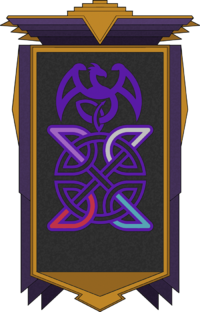 | |
| Religion | |
| Pronunciation | Dragon Worship |
| Origins | Unknown, presumed over 7000 years ago |
| Deities | |
| Rhaakhr, Asaph, Saaima, Anlon, and Qaarn | |
Origins
Dragon Worship or Dregodar is commonly believed to be the world’s oldest Religion, one that is uniquely shared by many Races and potentially the most widely worshiped religion across the world, while other religions are fairly monolithic within their own Race or Ideology. The nickname Dregodar dates back to the earliest Dragon Worship cults among the Altalar during the days of the Allorn Empire, a name specifically used to refer to their cult. While Dragon Worship is thousands of years older than the Altalar, the last major group of people who worshiped the Dragons were a sect of Altalar, hence it carries their name. After the collapse of the Allorn Empire, Dragon Worship was mostly kept alive in the largest population groups by Ailor, hence why the Dragon Worship pantheon mostly carries Proto-Daen names, the language used by the Ailor slaves who suffered their existence under the Allorn Empire. Dragon Worship was in fact one of the largest if not only religion followed by the Ailor slaves in the west, as the Dragons remained somewhat visible and tangible, while the Old Gods had all but disappeared. Following the collapse of the Allorn Empire, Dragon Worship entered a lull, with pockets of various races like the Isldar, Songaskians, Slizzar, Sihai and Urlan keeping their traditions alive, though living with the knowledge that all the Dragons save the eastern had died. Dragon Worship has more recently exploded back onto the scene with modern events, the return of Dragons, and their enduring campaign to revive all the Dragons who could not truly be killed. Many regions previously thought Unionist converted suddenly revealed their hidden Dragon Worship habits, thus exposing that Dragon Worship was far from dead, but actually one of the major religions of the world, being just behind Estellon and Unionism as the third largest religion in the world by number of worshipers, and only barely ahead of Void Worship coming fourth.
Core Identity
Dragon Worship is a Religion centered around the struggle against (or with) the Occult, with each Dragon having their own ideology and needs, and prescribed way of living. Dragon Worship is somewhat of a unique religion in that most of the dogma was inspired by the Dragons, but never dictated by them. While there were certainly Dragons who worked with the idea of themselves being seen as Gods, and used whatever benefit they could from that situation, the majority of Dragons do not actively demand worship and don't wish punishment on those who stray from the faith. The Dragons have always strictly insisted that spirituality towards them is a personal choice, and that faith is a personal choice, and that no matter what religion anyone follows, simply being alive is good enough to serve their needs.
Tenets
- Bravery: Caius demands bravery from the faithful, or face his eternal wrath for cowardice and weakness in purging fire.
- Calm: Nox demands calm in the face of chaos and anarchy, for the steadiest hands and cleanest mind plot the most skillfully.
- Pleasure: Aurora demands pleasure, because the purpose of life is to proliferate. Marriage is just a legal obstacle.
- Ambition: Valerius demands ambition, because static contentedness is the death of progress and change in a world in need of it.
- Diligence: Marik demands diligence, because the task set out to the faithful is never done, never given reprieve, never an end in sight.
- Revenge: The Void stole Ruin from the Pantheon, and the Dragons bid the faithful never to forget the damage infection has brought.
- Charity: Severena demands charity, for the agents of life are created in the sentient, who must share their intellect for the benefit of others.
- Honest: Regulus demands honesty, because history is the true arbitrator of truth, and truth always prevails.
- Purity: Dragon Worship does not outright ban Occult from worshiping, but proclaims to be pure and mundane, is the ideal for everyone to strive for.
- Preservation: Dragon Worship is the only faith nominally focused on the preservation of the world as it is, all living creatures and plants, and living harmoniously with nature.
- True Magic: Dragon Worship pats itself on the shoulder for being the users of "true" (Primal) Magic, a sense of moral superiority over Void and Exist and Ordial follows after.
Beliefs
- Narrative: Dragon Worshipers have the hauthy opinion that all other creation myths are false, and that the Dragons are actually the true creators of the world. Naturally most religions have ideas about creation myths of their own, but Dragon Worship has one based on more tangible fact that myth. Inversely however, while all other religions have one "grand message" or intention to imprint on the faithful, something for them to prove or do in their life, Dragon Worship has no such conceit, and just requests that the faithful live their life to the fullest without causing undue harm on other living beings without respect for nature, while also respecting some of the behavioral tenets for good conduct set out by the Dragons. Dragon Worshipers do not believe in an afterlife, at least not strictly understood by other religions. There is an afterlife for the Dragon Faithful, however they call them the "Soul Rivers", in which Souls exist in a state of ignorance and unconsciousness, meaning that while a soul can be preserved, there is no such thing as a living and wake afterlife. Dragon Worshipers, because of this belief, live their life to the fullest as they have it, because they only have one life to live.
- Canon Evil: Canon evil in Dragon Worship is all that which comes from other planes of reality or existence, meaning anything that is Void, Exist and Ordial. Rather than painting all of it evil by default however, truth (and the individual interpretations and ideologies of the Dragons) vary wildly from Dragon to Dragon. While all roughly agree that Void/Exist/Ordial (called "Infection") is bad, they all practically disagree on how to deal with it, or how severely bad it actually is.
- Identity: Dragon Worship has no real concept of sex or gender, nor does it have a view on sexual orientation. The only thing Dragon Worship does profess, is the need for the faithful to keep reproducing because the purpose of life is to exist and multiply to further life. While some would argue this means they do not look favorable upon those of same-sex orientations, the reality is that Dragons believe that there are plenty of heterosexuals who reproduce excessive amounts, to compensate for the few chaste, unable, and unwilling reproducing individuals.
- Conversion: Converting away from Dragon Worship is not a crime per se, but there are subtextual responses that one might get from different faithful. Caius worshipers might for example consider it weak and spineless, while Nox worshipers consider it willful ignorance that makes one more stupid. There is no outright punishment, but Dragon Worshipers have been known to give the cold shoulder to "traitors" of the faith. They do not go out to convert others however, Dragon Worship is a religion entirely benched on the providence provided by the very tangible actions of Dragons, and the faithful in general do not proselytize, but answer and reflect with those who show interest.
- Sins & Taboo: Dragon Worship lacks traditional Sins and Taboos, because even the concept of Sin is considered divine. While a morality and code to live by is created and the implication is made that going against this code is sinful, there is no real punishment system for sinners, and an argument can even be made that a sin is only a natural result of Nerida, the Dragon of Sin, who creates sin as a byproduct of free will, which in turn creates the structure for religion. To be free of Sin is to be free of free will and faith, neither of which are considered a good thing, as Dragons contemplate that spirituality is one of the foundational needs of sentient living beings.
Gods and Goddesses
Dragon Worship is divided over the 7 Great Dragons, each which is supported by 7 Supporting Dragons. Technically there are many more Dragons, for example, while in the realm of the Silver Dragons under Nox they reign supreme, the Yellow and Teal Dragons also exist. These however do not express spiritual guidance or an ideology, and merely exist to fulfill earthly functions of the Great Dragons, and as such are also not considered Gods, merely agents of them. The supporting Dragons act like officers, each governing an aspect of reality and enforcing it within their realm and across the world. Dragon Worshipers consider the usage of Magic an encroachment on the realm of their Gods, for example, if a Mage were to turn back time on an object, this would be a violation of the Dragon Ramirus, who is the enforcer of time, ensuring it always moves forwards and never backwards. This is entire foundation of why Void/Exist/Ordial are considered corruption or "infection", because they deny the laws of reality and how things are in Aloria by changing the rules. Choosing one particular Patron Dragon is important to Dragon Worshipers, though only in the purview of how to behave towards Occult. Dragon Worshipers worship in some part all Dragons equally, but choose one in particular to theme themselves and their ideology after. A Dragon Worshiper is likely to have some sort of shrine to each Dragon in their home, but one particularly large shrine for their favored Dragon, whose general ideology they have adopted as their own. There is no conflict in worshiping Caius as favored, and still bringing homage to Regulus even if their ideologies on the Occult differ, each ideology is considered valid in their own Draconic authority. This does not, however, stop conflict from arising among Dragon Worshipers on the "right" way to deal with a problem (the Occult). Among Dragon Worshipers, a strained truce usually reigns to prevent conflict among themselves while the Occult remain a problem. but clashes frequently break out when for example a Regulus worshiper is trying to protect an Occult from a Caius worshiper.
Aurora, Arbitrator of Nature
Regulus, Crownbearer of Command
Marik, Peacewarden of the Dead
Severena, Penultimate Defender
Caius, The Final Judgment
Nox, Weaver of Silk Accords
Valerius, Force for Change
Trivia
- Dragon Worshipers can change their preferred Dragon Throne, but tend to generally stick with one for their entire lives. Changing a Throne is not seen as something shameful, but continually doing it over and over is. It is also considered shameful if it is done on a whim, as opposed to a major life event.
- It is sometimes believed that Dragon Worship is compatible with Emended Unionism because Regulus being Cedromar is also a God in that pantheon, however this is not the case. Emended Unionism has some views about the Occult that are incompatible with Dragon Worship, and also generally prescribes to a more dogmatic life than Dragon Worshipers would tolerate. There may however be friendly relations between the two religions, which can be seen in Anglia where Regulus worshiping Isldar and Ailor live side by side with Emended Ailor.
- Infantilization or imitation of Dragons where not part of racial Abilities is considered taboo among the Dragon Worshipers. Imitation through mutations of Draconic features however is considered flattery. Dragons are however immensely offended, if their worshipers keep mini-dragon-like creatures as pets. Any religion would find this grossly offensive.
